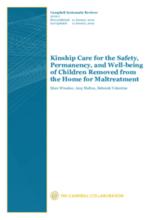This systematic review published by the Campbell Collaboration reviewed controlled experimental and quasi experimental studies in which children removed from the home for maltreatment and subsequently placed in kinship care were compared with children placed in non-kinship foster care for child welfare outcomes in the domains of well-being, permanency, or safety. Every year a large number of children around the world are removed from their homes because they are maltreated. Child welfare agencies are responsible for placing these children in out-of-home settings that will facilitate their safety, permanency, and well-being. However, children in out-of-home placements typically display more educational, behavioural, and psychological problems than do their peers, although it is unclear whether this results from the placement itself, the maltreatment that precipitated it, or inadequacies in the child welfare system.
One-hundred-and-two quasi-experimental studies, with 666,615 children are included in this review. It concludes that current best evidence suggests that children in kinship foster care may do better than children in traditional foster care in terms of their behavioural development, mental health functioning, and placement stability. Children in traditional foster care placements may do better with regard to achieving adoption and accessing services they may need. There were no negative effects experienced by children who were placed in kinship care. The major limitation of this systematic review is that the quality of research on kinship care is weakened by the poor methods of the included studies. Implications for practice and future research are discussed in the paper. The authors highlight that although the review supports the practice of treating kinship care as a viable out-of- home placement option for children removed from the home for maltreatment, policies mandating kinship placements may not always be in the best interest of children and families. Professional judgment from child welfare practitioners must also be used to assess the individual needs of children and the ability of kin caregivers to attend to these needs.
©The Campbell Collaboration

